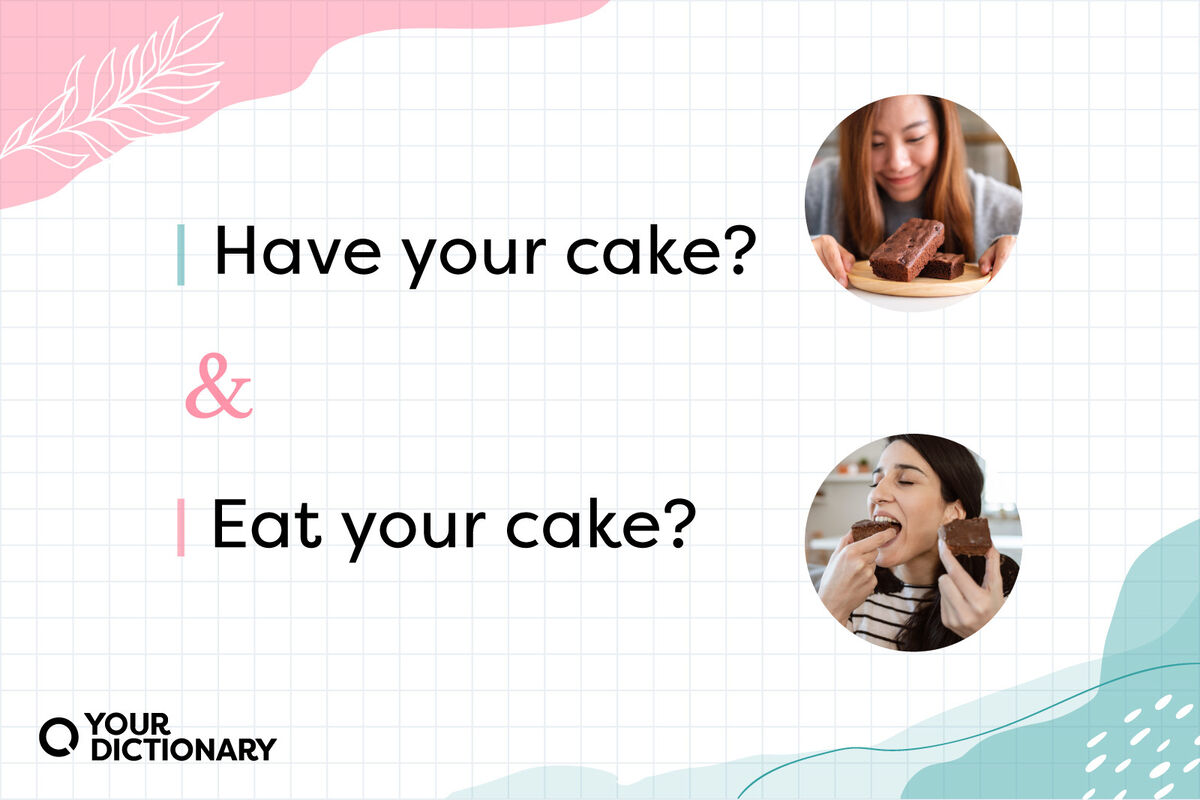
If you have your cake, you can eat it too, right? The answer might seem obvious, but when it comes to the idiom “have your cake and eat it too,” it’s not so clear-cut. Just how many ways can you have your cake — or rather, how many ways can you correctly use this phrase?
What Does the Infamous Cake Phrase Mean?
The saying “Have your cake and eat it too” may sound nonsensical (not to mention make you hungry), but it basically means “you can’t have it both ways” or “you can’t have two good things at once.”
Can or Can’t You Have Your Cake and Eat It Too?
While people say both you can and can’t “have your cake and eat it too,” it’s really meant to be “can’t have your cake and eat it too.” This just makes more sense with the meaning “you can’t have it both ways.”
-
If you say “you can have your cake and eat it too,” that means that you can, in fact, have it both ways, which contradicts the meaning of the expression.
-
When you say “you can’t have your cake and eat it too” it means you can’t have it both ways or you can’t have two things at once.
So Why the Confusion?
Part of the reason people get confused about whether they can or can’t have their cake seems to come down to the word have. Have means “to possess” or “to consume,” but in this phrase, it has more to do with eating.
Proper grammarians would say this phrase should be, “You can’t eat your cake and have it too.” Think of it like this: “If I eat the cake now, I won’t have any later.” In other words, you can't have two good things at once.
Do You Need the ‘Too’?
To add to the confusion, you may second guess whether or not you need too at the end. In British English, too is often dropped so it’s just “you can’t have your cake and eat it.” Ultimately, the too is optional, as is whether or not you put a comma before it.
Origin of ‘Have Your Cake and Eat It Too’
The proverb “have your cake and eat it too” probably started with a letter from Thomas, Duke of Norfolk to Thomas Cromwell in 1538. The letter reads:
A man can not have his cake and eat his cake.
It appeared again as a proverb in 1546 in A Dialogue Conteinyng the Nomber in Effect of All the Prouerbes in the Englishe Tongue as:
Wolde you bothe eate your cake, and have your cake?
Yet another version made an appearance in John Davies’ 1611 Scourge of Folly:
A man cannot eat his cake and haue it stil.
Other Flavors of ‘Have Your Cake and Eat it Too’
No matter what country you’re in or what language you speak, you can still find a way to say “can’t have your cake and eat it too.” While the expressions are all unique, they each essentially mean you can’t have it both ways.
-
Finnish: Kakkuja ei voi sekä syödä että säästää - cakes can not be both eaten and stored (at the same time)
-
French: Vouloir le beurre et l’argent du beurre - to want the butter and the money used to buy the butter
-
Hebrew: אי אפשר לאכול את העוגה ולהשאיר אותה שלמה - you can't eat the cake and keep it whole
-
Hindi: दोनों हाथ में लड्डू होना - to have a laddu (a sweet candy) in both of your hands
-
Italian: Volere la botte piena e la moglie ubriaca - to want the barrel full (of wine) and the wife drunk
-
Polish: Zjeść ciastko i mieć ciastko - to eat the cookie and have the cookie
-
Swedish: Att äta kakan och ha den kvar - to eat the cookie and still have it
-
Welsh: llwch chi ddim cadw torth a’i bwyta hi - you can’t keep a loaf and eat it
More Idioms: The Icing on the Cake
“Have your cake and eat it too” is just one of many idioms in the English language. Sample some other selections.